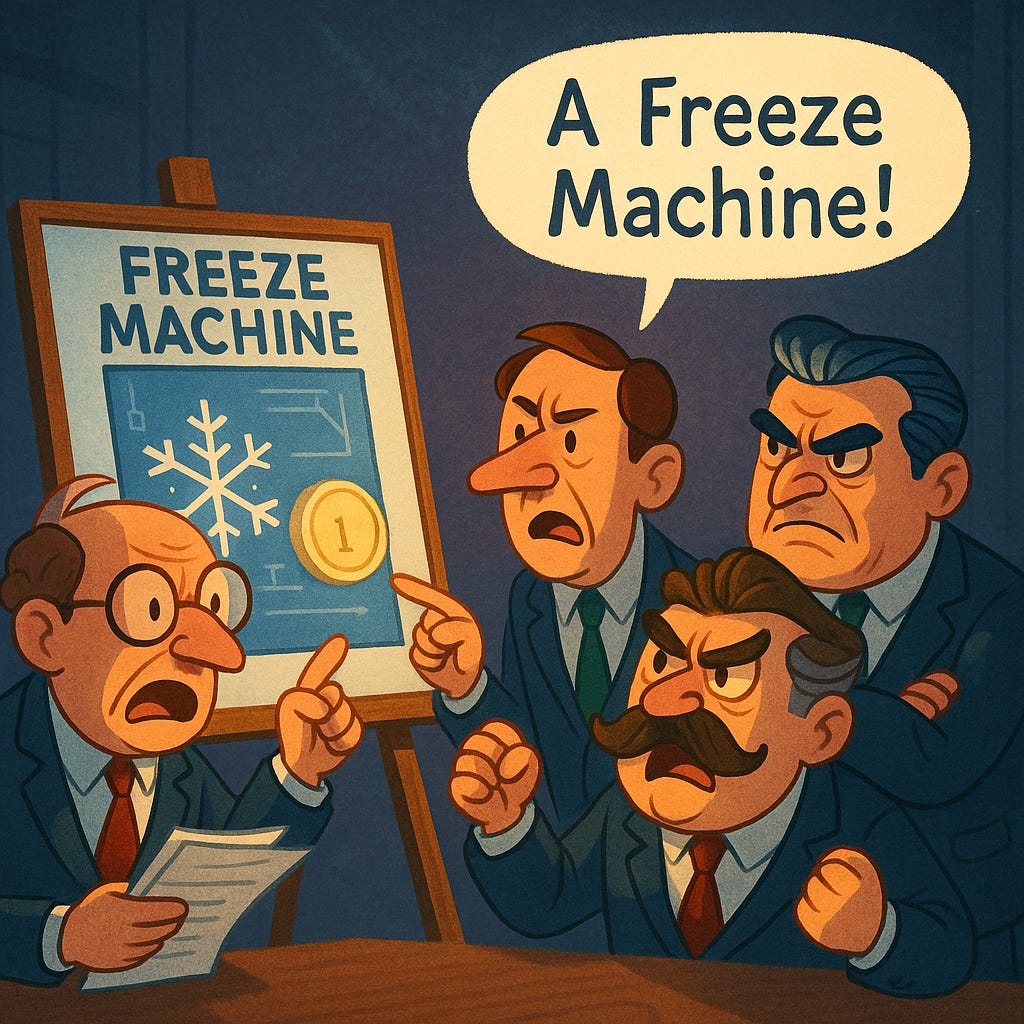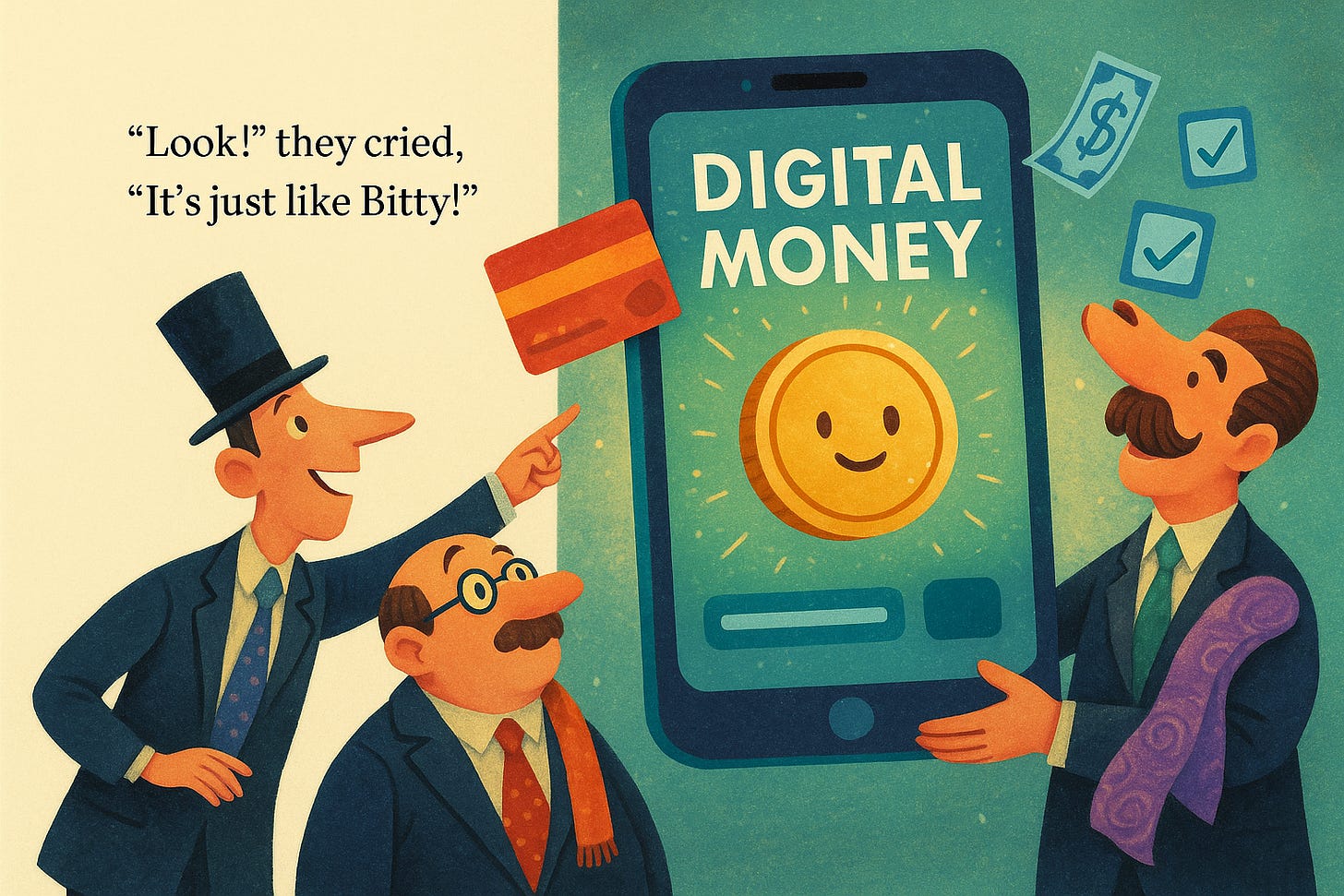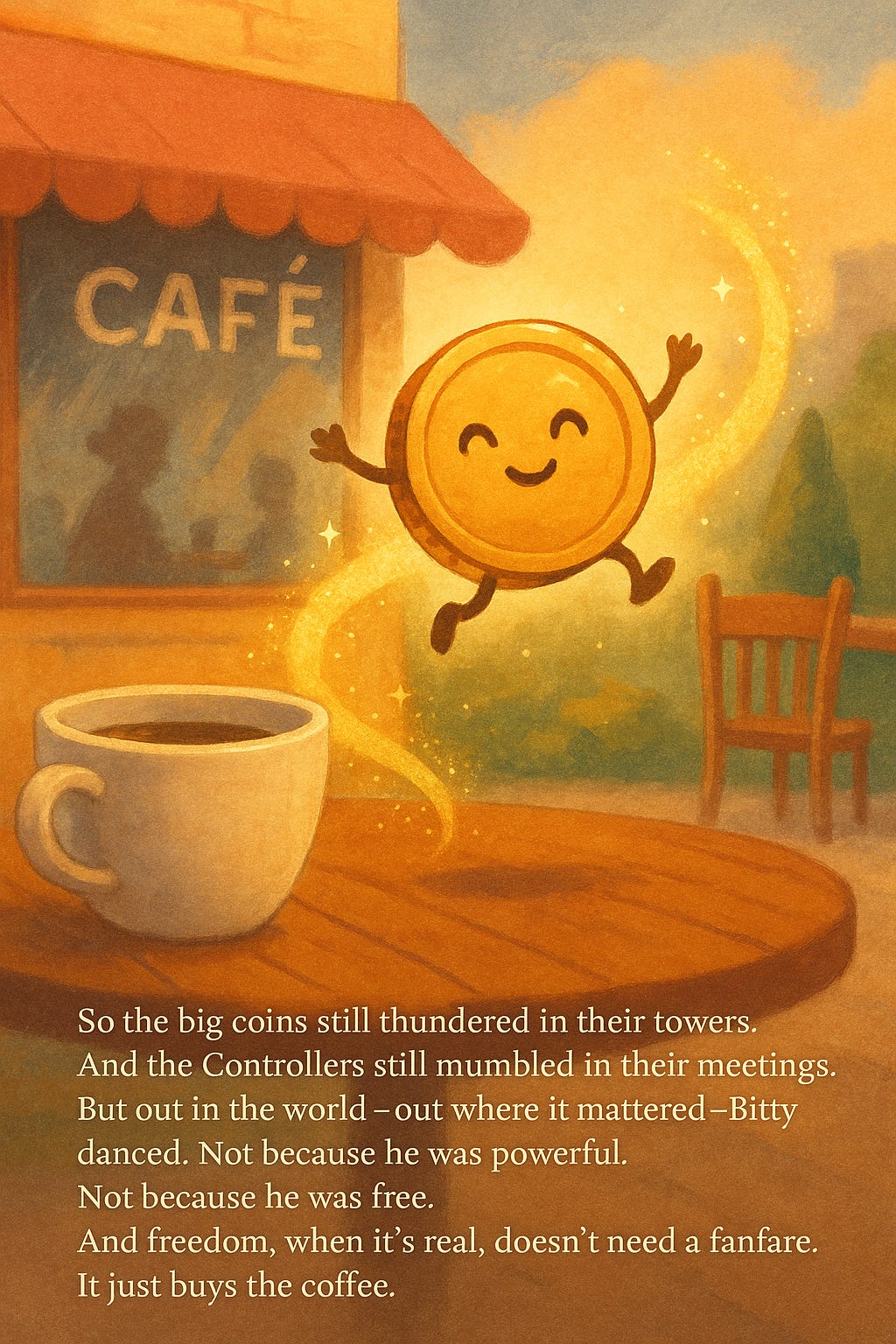The Little Coin That Wasn’t Afraid
A Children’s Picture Book (Ages 6–10) on Electronic Cash
A small, curious digital coin named “Bitty” lives in a world where big banks and grown-up governments rule over the flow of money. But Bitty isn’t interested in fancy suits or expensive briefcases—he just wants to help people buy cookies, tip the baker, or send a smile across the world for just a penny. But when the Big Controllers find out, they try to stop him. What they don’t expect is how powerful one little coin can be when it chooses to be free.
In the humming, blinking, slightly confused world inside a computer—where wires dream of being spaghetti and every beep thinks it's important—there was born a coin. Not a big coin. Not a heavy coin. Not even a particularly well-minted coin.
He was small, round, and had the sort of cheerful glint that suggested he’d help you buy a biscuit and ask nothing in return.
His name was Bitty. And Bitty had one mission in life: to be useful in the tiniest, most convenient ways imaginable - solving the inconvenient .
The world outside Bitty was ruled by Big Coins. Enormous, important coins with very shiny surfaces and very serious faces. They clanked when they moved. They had offices. Some even had chairs with lumbar support.
These coins didn’t roll—oh no. They processed. They were transferred. They required forms in triplicate just to sneeze.
And they didn’t like Bitty.
Not because he was bad. But because he was small. And worse—he was fast.
Bitty zipped through cafés, bus stops, bookshops, and browsers—leaving behind just enough to say, “Thanks!” or “Nice song!” or “Here's a penny for your poem.”
He was everywhere the Big Coins weren’t. He didn’t need bodyguards, passwords, or an expensive suit.
And that made him dangerous.
Because nothing scares important people more than something small behaving like it doesn’t need permission.
Far away, in a tower filled with swivel chairs and very serious eyebrows and words like HODL, the Controllers were not amused.
One of them spilled his coffee. Another dropped his Important Graphs. A third clutched his pearls—figurative, but very expensive.
“Who is letting this... tiny coin run about unsupervised?” they thundered.
They didn’t fear crooks or robbers. They feared the baker. The busker. The girl who paid for tea without filling out Form 88-B.
The Controllers held an emergency meeting. Which meant everyone shouted, nobody listened, and someone ordered sandwiches that no one ate.
“We need rules!” barked the one with the loudest tie.
“We need forms!” snapped the one with the longest nose.
“We need... a Freeze Machine!” declared the one whose moustache looked like it filed complaints for fun.
They all agreed: Bitty must be stopped before someone used him to buy... a second biscuit. Without approval.
So they built it.
A colossal contraption of red tape, blinking lights, and official stamps—so many stamps it needed its own librarian. The Freeze Machine didn’t hum. It sulked. It made the kind of noise that suggested it disapproved of your shoes.
It watched every coin. Especially small ones. Especially Bitty.
But Bitty wasn’t in the mood to be watched.
He just winked, spun twice, and zipped straight through the cracks.
Frustrated, the Controllers tried a new trick. They didn’t chase Bitty—they chased language.
They took the words “digital money” and dressed them up in silk and nonsense. They made cards that beeped and apps that smiled.
“Look!” they cried, “It’s just like Bitty!”
Except it wasn’t.
It was slow. It was leashed. And it asked you to tick three boxes and prove you were wearing clean socks before it bought you a sandwich.
The people stared at their new “digital money” and blinked.
It beeped politely. It asked them to confirm. It wanted their name, their shoe size, and possibly a letter from their grandmother.
They swiped. They tapped. But something was missing.
It didn’t feel like spending.
It felt like asking for permission. With sparkles.
Bitty watched it all from the wires.
He saw the sparkly buttons. He saw the swishy cards. He saw people smiling with their mouths and sighing with their souls.
“This isn’t how it’s meant to feel,” he thought. “Money shouldn’t need a note from your bank manager and a bedtime story.”
And so, Bitty did what any small, unregistered, unrepentantly cheerful coin would do.
He zipped off into the world again—quiet as a thought, quick as a giggle.
And something marvellous happened.
Bitty helped a girl send a penny to her granddad. Just one. No questions. No forms. No digital fingerprinting of her tea preferences.
The granddad chuckled, bought a bun, and tipped the baker.
The baker paid the fiddler, who sang for the florist, who smiled at the butcher, who danced with the librarian, who—
Well, you get the idea.
Bitty had started a chain reaction of cheer. And all without asking once.
The Controllers scrambled.
“It's spreading!” they shrieked. “Stop the tipping! Ban the biscuits!”
They waved clipboards. They summoned committees. They even tried frowning harder.
But people just laughed.
“It's only a little coin,” they said, sipping their tea. “What’s the worst it can do?”
(Which, incidentally, is the exact sentence history writes down right before something very interesting happens.)
Bitty didn’t roar. He didn’t march. He didn’t even raise his voice.
He simply moved.
From one person to another. Quiet as a smile. Soft as a thank-you. Unstoppable as a sneeze in a library.
Because real freedom doesn’t wear boots.
It jingles in pockets. It clinks in cups. And it never, ever asks for a receipt.
They say power comes from palaces, passwords, and very large desks.
But Bitty knew better.
Power lives in the tiny moments—
a coin passed hand to hand,
a thank-you dropped like sunlight,
a laugh paid forward.
And in those moments, small things become mighty.
So the big coins still thundered in their towers.
And the Controllers still mumbled in their meetings.
But out in the world—out where it mattered—Bitty danced.
Not because he was powerful. Not because he was rich.
But because he was free.
And freedom, when it’s real, doesn’t need a fanfare.
It just buys the coffee.
And never explains.
The world didn’t notice at first.
No headlines. No parades. No thunderclaps from the sky.
Just small things. A poem paid for. A promise kept. A baker who smiled because someone, somewhere, sent a tiny coin that said, “You matter.”
And in that glint, in that quiet jingle through the wires,
Bitty became something very few things ever manage to be.
He became trusted.
So if one day a coin lands softly in your pocket,
or flutters through your phone like a moth with good manners—
don’t ignore it.
It might be small. It might be quiet.
But it carries something enormous:
a whisper of choice,
a glimmer of mischief,
and the polite insistence that freedom belongs in the tiniest things.





















That’s great! If that was about BTC all of the btches would be frothing with delight. As you wrote it, they will seethe with anger. Kind of exposes how they actually hate Bitty. Who would hate bitty but a madman?
It's a very sweet story! But how is this peer to peer adoption going to happen of this fast and unpretentious coin? Most people, like me, aren't tech-savvy. We are busy in our own fields of expertise. If that's not tech or finance, we will probably not have heard of bitcoin or blockchain or cryptocurrencies. Maybe now, that president Trump has been talking about creating a Bitcoin Reverse, but we probably still don't have the time needed to delve deeply into the subject matter because our lives are full in so many ways. We will therefore just accept whatever the news media or experts tell us. This is the challenge I see. There are no education channels available for the non-tech-savvy population (which is the majority of humanity!) on how to easily use this fast, unpretentious coin as p2p digital cash so that mass adoption could occur.